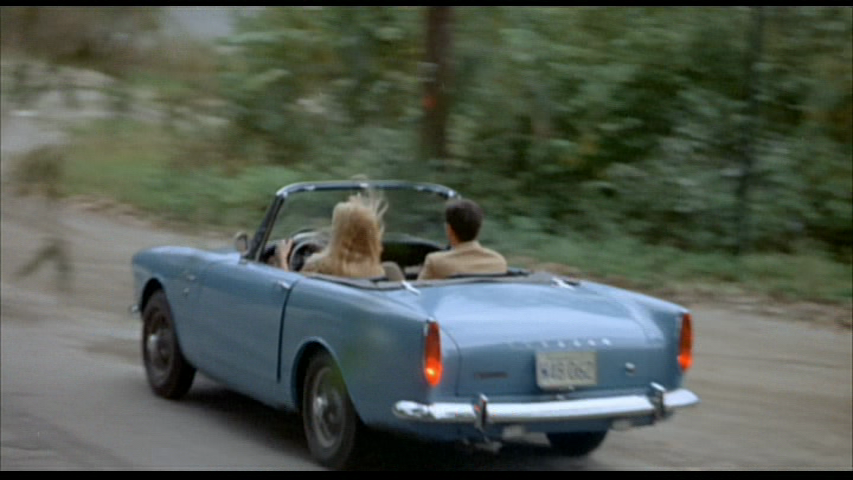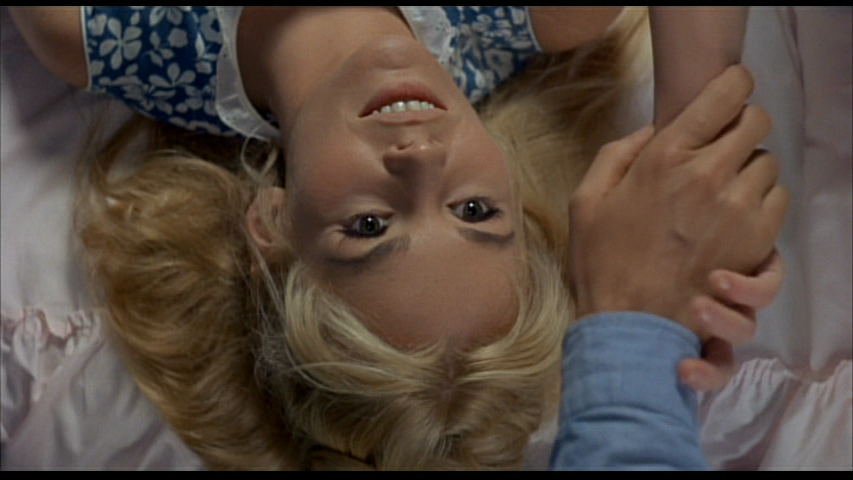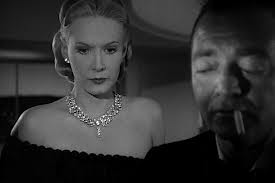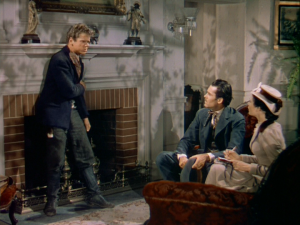
Are you a traitor?
Thanks to the savage guy, I have another cinema oddity to savor and comment on – Shack Out on 101 from 1955. Everyone who comments on this film, including me, agrees that it is bizarre. And strangely entertaining, despite the incredible stuff it contains. Most call it a red-scare noir, but I don’t quite see the noir aspects of it, except in a very watered-down state. I can say, however, I know of nothing else like it!
Nearly the entire action takes place in a run down diner on Highway 101 – once again I find myself thinking of the classical dramatic unities! Anything on the beach of southern California gives me a nostalgic tug, but there are precious few outside shots in this film: just a few scenes on the beach, including the opening which is much talked about.

We see a woman in a bathing suit lying in the sun at the surf’s edge; then we see Slob (Lee Marvin), talking into a cellphone…oops, that’s a shell-phone! No, he’s just listening to the sea in a shell, with the coastal bluffs as a backdrop.

Then he swoops onto the woman and kisses her as she violently resists him. It’s all in “fun,” they know each other, and he’s just giving her a major hard time and tease. He runs off laughing as she fumes. When he reaches the porch of the shack where they live and work slinging hash, he takes her underwear off the clothes line and grinds it into the dirt. This will occasion much talk indoors about how he is now obligated to buy her, Kotty, a new petticoat, the meanie!

Slob’s faux assault on Kotty prefigures some brutally real violence between them later on, but for now, the movie moves on between comedy, farce, and absurd Cold War espionage. Slob is part of a spy network, passing on secrets gleaned from fellow travelers at the nuclear research lab up the road. His boss, George (Keenan Wynn) is not part of the ring. Nor is George’s friend Eddie, a traumatized WWII vet who can’t get over his experience on D-Day. The two of them actually have some pretty affecting straight talk about what that’s all about. Through it all, some mighty strange stuff plays out on stage at the beanery.
George and Slob get into comparing their physiques during a work-out.

Marvin is all over the place in this film, really hamming it up at times. Here he reveals to George that what he really desires is a “nice, big neck.”

They go on to comparing their legs, and ask an impartial judgment. Didn’t that sort of thing start a long war in the old days?
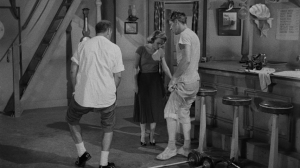
Kotty knows better than to pick a winner, and besides, nobody has better legs than she does. That’s that!

George is determined to get Eddie to beat his fears of blood, violence, adventure, and even killing of fish (!) that the war left him with. He’s planning a snorkeling adventure in Mexico which they act out in front of everyone present. Yes, they do look like aliens…

Meanwhile, Kotty has a romance going on with the professor from the nuke lab. At first, it seems that he is in with the spies, but of course, that’s a cover. He tenderly supports Kotty’s ambitions to take a civil service exam so that she can get a desk job in the government doing something important. Boy, have ideas changed!
Being sort of noir, there’s a mirror, a double-identity. And that hand! All the passion of Venus is there!

Cut from the love scene to Slob and his courier in the kitchen. Right after the kiss, the guy shoves a fish at Slob’s mouth.

Here’s where it get’s pretty weird. We are definitely into homo-erotic territory here – look at the grins on their faces as they agree to start up their favorite game…

Nothing these guys enjoy more than a little dance with a rag while they take turns pummeling each other.

About this time, Kotty realizes that something is going on around here. These “truck drivers,” always teasing and coming on to her, have awfully soft hand for working slobs.
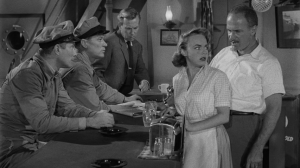
Eventually, she has a confrontation with Slob when he realizes his cover is blown. Now the violence is for real. First he threatens her repeatedly with a nasty knife, but she’s tough – she doesn’t blink. Then – incredible! – he throttles her and smashes her head out of the window. Then he starts garroting her with some underwear! After all the kooky stuff in this film, this scene is genuinely shocking.

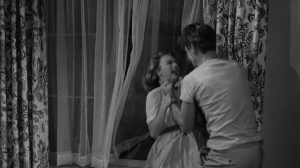

Of course, the good guys win in the end. You knew that already, right?





 Posted by Lichanos
Posted by Lichanos 







